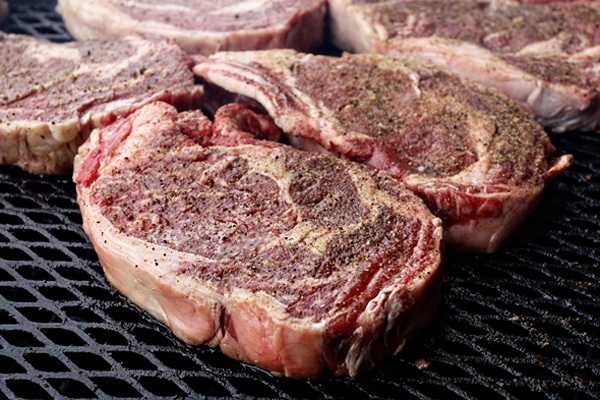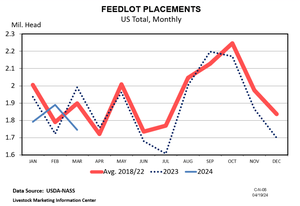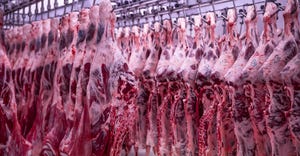January 28, 2014

My husband Tyler and I are expecting our first baby in June, and we are excited to add a little cowboy or cowgirl to our family. A few weeks ago, I shared our news on my Facebook profile; following that, I received a message from an old college classmate that really piqued my attention.
She wrote to me: “Amanda, I have been hearing a lot about how pregnant women aren't supposed to eat red meat while carrying a baby. I was just wondering if your doctor told you that or if you have heard that from others and how you would respond.”
Of course, this being my first pregnancy, I’m learning as I go. When I found out we were expecting, like many newbie mothers-to-be, I ran to the store to buy pregnancy books to help guide me through this experience. Books like “What To Expect When You’re Expecting,” and “How To Make A Pregnant Woman Happy” (the latter was for Tyler) explained to me the ins and outs of growing a human for 40 weeks and what I could expect.
Subscribe now to Cow-Calf Weekly to get the latest industry research and information in your inbox every Friday!
One of the big things these books included was a list of dos and don’ts, such as no sushi, no wine, no hot tubs, drink plenty of water, and get lots of sleep. Red meat was also listed in the “don’t” category, with instructions to avoid cold cuts and processed meats unless they were fully cooked. They also advised to make sure burgers and steaks were well done. One book even warned of the dangers of hamburger, and how it was best to have a local butcher freshly grind organic beef to avoid contamination.
You can cue my eye roll here.
Along with her inquiry about red meat and my pregnancy, my college friend forwarded me an article she had come across featured in Baby Med, “A New Reason To Cut Back On Red Meat During Pregnancy.”
Writer Rachel Neifeld, RD, CDN, immediately shows her bias by opening her opinion piece with how red meat is not a good protein source for pregnant women or the general population. She warns that steaks and burgers, along with bacon, hot dogs and salami, can raise mortality rates by 20%.
She then writes, “A study looked at data for the Nurses’ Health Study II cohort between 1991 and 2001 and included pregnancies free of previous gestational diabetes (GDM) or other chronic diseases. The researchers found that women with the highest intake of animal protein had a much greater risk of developing GDM than those with the lowest intake. Findings showed that substituting 5% of animal protein for vegetable protein could cut the risk of GDM in half. The study also showed that the substitution of red meat with poultry, fish, nuts, or legumes demonstrated a significantly lower risk of GDM.”
Now, I’m neither a doctor nor a nutritionist, but there’s something fishy about pinning GDM on red meat. It reminds me of a similar article I responded to awhile back about a nutritionist who claimed red meat increases diabetes risk in the general population. I’m simply not buying it. Red meat is a low glycemic food packed with protein to keep us satiated longer. It’s a slow-burning fuel that doesn’t cause a spike in insulin, so how could it possibly be a cause for diabetes?
Moreover, GDM wasn’t an issue for our ancestors, like the Inuits, who carried healthy babies while thriving on meat-based diets. It’s just common sense, in my opinion. My doctor told me to eat plenty of protein, consume nutrient-dense foods like beef, and cut back on sugary items like fruit juice to help me limit weight gain during pregnancy. Suffice it to say, my doctor is a good one!
Other trending articles at BEEF:
7 U.S. Ranching Operations Are "Best of the Best" In Stewardship
Cows Out On Pasture | 80+ Grazing Photos From Readers
5 Ways Cattle Help The Environment
The writer then recommends more beans, lentils, tuna, nuts and soy-protein meat substitutes as protein options of choice. That�’s fine and dandy, but as a pregnant woman, I can tell you I’m not craving tuna and tofu for my meals, nor do I think they would fuel my body like beef would.
To further support my opinion that red meat is a power food during pregnancy, let’s take a look at this article entitled, “The Importance Of Red Meat During Pregnancy And Weaning,” from Carrie Ruxton, PhD, registered dietician and public health nutritionist.
Ruxton writes, “Red meat is often in the news but not necessarily for positive reasons. Whether the story relates to horse meat in burgers, heart disease or cancer, the media coverage tends to raise concerns rather than giving us balanced information. So, should pregnant women eat red meat? And is it safe to give red meat to our babies and toddlers? From a dietitian’s viewpoint, I would say ‘yes!’
“Red meat is one of the best sources of iron in the diet as it contains a special type, called heme iron, which we can absorb efficiently. In contrast, while spinach is viewed as a good alternative to meat, it contains non-heme iron, only 10% of which is absorbed by our bodies. Surveys show that women, teenage girls and toddlers tend to have low iron intakes and, in many cases, have low iron stores. This means that they are more susceptible to iron deficiency and the associated symptoms of tiredness and loss of concentration. Eating red meat is a good way to boost iron stores.”
Of course, whatever a woman chooses to eat during her pregnancy is her decision, and hers alone. For myself and my baby, I choose to ignore the fear-mongering and base my decisions on science and common sense. Excuse me, while I go eat a steak now.
What do you think? Is red meat a good choice for pregnant women? Share your stories and advice for new mothers in the comments section below.
You might also like:
60 stunning photos that showcase ranch work ethics
Is the New York Times naive about MARC or intentionally misleading?
7 U.S. cattle operations honored for stewardship efforts
9 lessons to make your ranching life richer
Better weather, continued strong feeder prices on tap for 2015
You May Also Like



